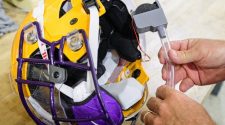A growing number of current and former Sox players who were with the team that season have already said they don’t expect much will be found.
A larger question, one that Clark and his staff have been discussing with players as they tour spring training camps, is how much of a role technology should play in the game beyond the outsized influence it already wields.
The Astros cheating scandal that has roiled the sport is a byproduct, however unintentional, of baseball’s embrace of high tech.
Under former general manager Jeff Luhnow, the Astros used data to change how they scouted, developed, and utilized players. Scouts were fired in favor of making decisions purely on the numbers. High-speed cameras and remote monitoring replaced boots on the ground.
Emotion was taken out of the equation.
That a large group of Astros players was comfortable using live video to be more efficient at stealing signs shouldn’t have come as much of a surprise. They played for an organization that apparently was lacking a moral compass from the top down.
“We’ve seen technology boom in a way that our industry never has here in the last 10 years,” Clark said. “The culture that it’s created, and that’s been allowed to be created left unchecked, is manifesting itself in ways that a number of us had concerns about, were interested in talking about, and now we found ourselves on the doorstep of what I hope are those exact conversations.”
Clark and commissioner Rob Manfred are discussing how best to limit the access players have to live video during games, and those rules are expected to be in place for Opening Day.
My suggestion a few weeks ago was to ban it entirely during games. MLB may not go that far, but there certainly will be much tighter restrictions.
“The changes that we anticipate making and working on with the league, we hope it lends itself to there not being a conversation about sign stealing moving forward,” Clark said.
But Clark’s concerns, and those of many players, go beyond sign stealing.
Baseball clearly needed a replay system to correct egregiously blown calls, but now games are delayed to determine whether a base runner’s leg came ever so slightly off the bag while a glove was on him.
Managers also ask for calls to be reviewed late in games for no good reason other than that they have a challenge left.
That wasn’t the spirit of the rule when it was implemented.
From the union’s perspective, technology also is changing how players are paid. Pitchers are prized for their spin rate and batters for exit velocity, metrics that couldn’t be measured until a few years ago.
Statistical analytics were a better way to parse the results, but they never damaged the product on the field. If anything, they helped make it more interesting because we could better understand the value of players.
But the technology revolution has changed the game, creating a generation of young hitters consumed with getting the ball in the air and pitchers who value velocity far more than creativity.
A series of strikeouts interrupted by an occasional home run isn’t particularly enjoyable. Strikeouts have increased by 14.4 percent in the last five years.
Managers certainly aren’t powerless in all of this. But their job is increasingly focused on maintaining clubhouse harmony while the analytics staff prepares game plans.
Any manager who resists the data won’t be around for long.
“I think our entire industry has been affected by technology and the atmosphere and considerations around efficiency,” Clark said. “I think it has been on and off the field affected in a way that’s not necessarily beneficial to anybody.”
The Red Sox, as an example, use portable devices to monitor every bullpen session and batting-practice swing. That’s smart; they should know everything they can about their players.
In theory, that information is used to improve performance. But it’s also used as a tool to determine a player’s physical ability and, in turn, his value. Should the players and the representatives have access to that information?
These issues will all be part of the discussions for the next collective bargaining agreement.
“I think it spans every aspect of our industry,” Clark said.
Sign stealing can be fixed by turning off some monitors. How baseball gets fixed, or at least improved, won’t be as easy.
Peter Abraham can be reached at [email protected]. Follow him on Twitter @PeteAbe.












